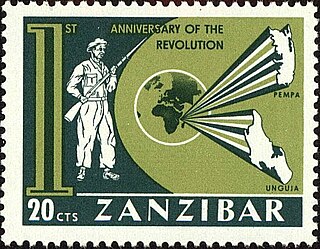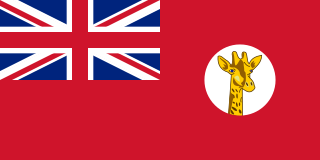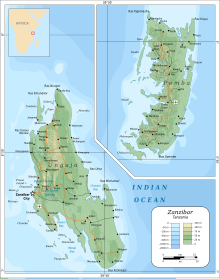The modern-day African Great Lakes state of Tanzania dates formally from 1964, when it was formed out of the union of the much larger mainland territory of Tanganyika and the coastal archipelago of Zanzibar. The former was a colony and part of German East Africa from the 1880s to 1919 when, under the League of Nations, it became a British mandate. It served as a British military outpost during World War II, providing financial help, munitions, and soldiers. In 1947, Tanganyika became a United Nations Trust Territory under British administration, a status it kept until its independence in 1961. The island of Zanzibar thrived as a trading hub, successively controlled by the Portuguese, the Sultanate of Oman, and then as a British protectorate by the end of the nineteenth century.

The national flag of Tanzania consists of a Gold-edged black diagonal band, divided diagonally from the lower hoist-side corner, with a green upper triangle and light blue lower triangle. Adopted in 1964 to replace the individual flags of Tanganyika and Zanzibar, it has been the flag of the United Republic of Tanzania since the two states merged that year. The design of the present flag incorporates the elements from the two former flags. It is one of a relatively small number of national flags incorporating a diagonal line, with other examples including the DR Congo, Republic of the Congo, Namibia, Saint Kitts and Nevis, Trinidad and Tobago and Brunei.

The Afro-Shirazi Party (ASP) was an African nationalist and socialist Zanzibari political party formed between the mostly Shirazi Shiraz Party and the mostly African Afro Party.
Zanzibar is an autonomous part of Tanzania.

The Zanzibar Revolution began on 12 January 1964 and led to the overthrow of the Sultan of Zanzibar Jamshid bin Abdullah and his mainly Arab government by the island's majority Black African population.
The following is a list of the political history of East Africa.

The Sultanate of Zanzibar, also known as the Zanzibar Sultanate, was an East African Muslim state controlled by the Sultan of Zanzibar, in place between 1856 and 1964. The Sultanate's territories varied over time, and after a period of decline, the state had sovereignty over only the Zanzibar Archipelago and a 16-kilometre-wide (10 mi) strip along the Kenyan coast, with the interior of Kenya constituting the British Kenya Colony and the coastal strip administered as a de facto part of that colony.

The flag of Zanzibar was adopted on 9 January 2005. It is a horizontal tricolour of blue, black, and green with the national flag of Tanzania in the canton.

Tanganyika was a colonial territory in East Africa which was administered by the United Kingdom in various guises from 1916 until 1961. It was initially administered under a military occupation regime. From 20 July 1922, it was formalised into a League of Nations mandate under British rule. From 1946, it was administered by the UK as a United Nations trust territory.

The Swahili coast is a coastal area of East Africa, bordered by the Indian Ocean and inhabited by the Swahili people. It includes Sofala ; Mombasa, Gede, Pate Island, Lamu, and Malindi ; and Dar es Salaam and Kilwa. In addition, several coastal islands are included in the Swahili coast, such as Zanzibar and Comoros.

Tanzanian nationality law is regulated by the Constitution of Tanzania, as amended; the Tanzania Citizenship Act, and its revisions; and various international agreements to which the country is a signatory. These laws determine who is, or is eligible to be, a national of Tanzania. The legal means to acquire nationality, formal legal membership in a nation, differ from the domestic relationship of rights and obligations between a national and the nation, known as citizenship. Nationality describes the relationship of an individual to the state under international law, whereas citizenship is the domestic relationship of an individual within the nation. Commonwealth countries, including Tanzania, often use the terms nationality and citizenship as synonyms, despite recognising their legal distinction and the fact that they are regulated by different governmental administrative bodies. For much of Tanzania's history racist policy curtailed domestic rights and nationality. Tanzanian nationality is typically obtained under the principle of jus soli, i.e. by birth in the territory, or jus sanguinis, i.e. by birth in Tanzania or abroad to parents with Tanzanian nationality. It can be granted to persons with an affiliation to the country, or to a permanent resident who has lived in the country for a given period of time through naturalisation.

This is a survey of the postage stamps and postal history of Zanzibar.
British protectorates were protectorates—or client states—under protection of the British Empire's armed forces and represented by British diplomats in international arenas, such as the Great Game, in which the Emirate of Afghanistan and the Tibetan Kingdom became protected states for short periods of time. Many territories which became British protectorates already had local rulers with whom the Crown negotiated through treaty, acknowledging their status whilst simultaneously offering protection, e.g. British Paramountcy. British protectorates were therefore governed by indirect rule. In most cases, the local ruler, as well as the subjects of the indigenous ruler were not British subjects. British protected states represented a more loose form of British suzerainty, where the local rulers retained absolute control over the states' internal affairs and the British exercised control over defence and foreign affairs.

Tanzania–United Kingdom relations are bilateral relations between Tanzania and the United Kingdom. The United Kingdom has historically been a partner of Tanzania in many areas, particularly trade and security.
The Sultanate of M'Simbati was a micronation founded in 1959 in Tanganyika by Englishman Latham Leslie Moore, approximately 25 km southeast of Mtwara.
Zanzibari independence is a political ambition of some political parties, advocacy groups, and individuals of Zanzibar, a semi-autonomous region territory within Tanzania, to become an independent sovereign state.



















